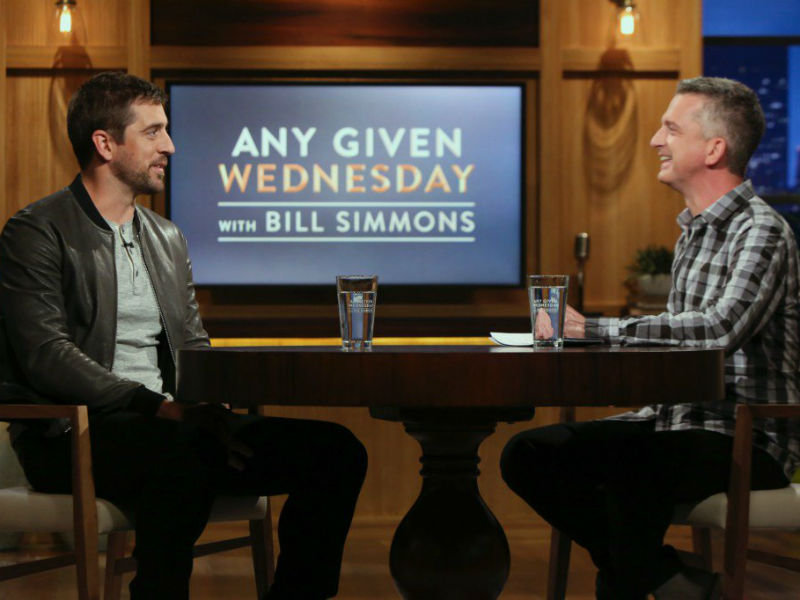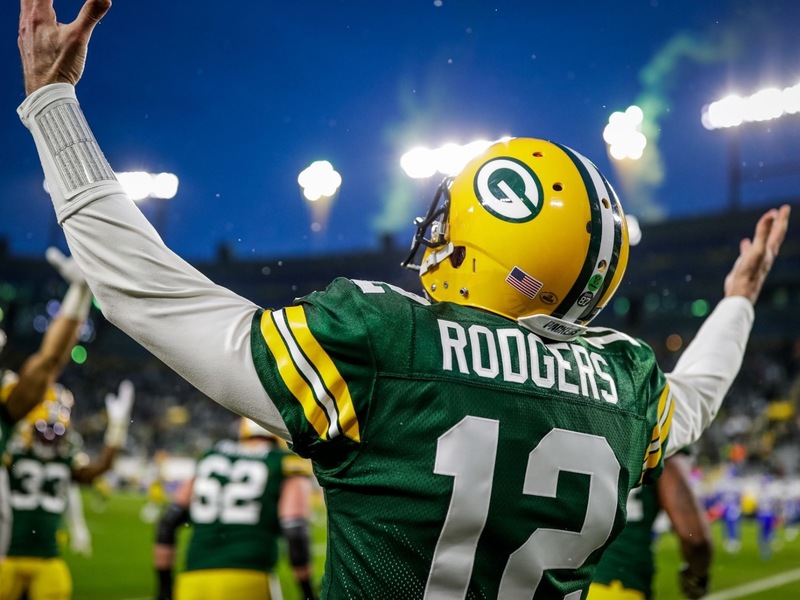Aaron Rodgers sat down with Bill Simmons last night for the sports pundit's new HBO show, "Any Given Wednesday," and the interview went as expected.
Which is to say, it was amusing, entertaining, at times enlightening and often predictable. There was Rodgers smirking, talking about his confidence (not to be confused with arrogance!), giving politically correct answers about loving all of Wisconsin's sports teams and also thoughtfully discussing issues like concussions in the NFL. There was Simmons grinning, talking about getting high at a Fleetwood Mac concert, shoehorning Tom Brady and the Patriots into multiple questions and using his personable style to get Rodgers to open up on a number of interesting topics – none of them, thankfully, being little brother Jordan. And of course there was a little Brett Favre.
It was, as went Simmons' old podcast tag line, "a free-flowing conversation that occasionally touches on mature subjects" and it was enjoyable. And hey, at least the Packers' quarterback wasn't drunk, like one of Simmons' first-episode guests, Ben Affleck.
Since no one paraphrases Rodgers as well as he speaks for himself, and since his notoriously long memory would no doubt remember and punish a misrepresentation, here are some of his more locally relevant quotes (condensed from the entire interview) from Wednesday night's show.
Bill Simmons: What’s the most fun thing you’ve done this offseason?
Aaron Rodgers: I played golf with the president. I love golf. But I haven’t played well this offseason. I got to play Augusta (National Golf Club) twice and I got to play St. Andrew’s Air Force Base with the POTUS himself. I played good that day. But he’s a very athletic, talented golfer. I was impressed.
Did Obama smoke a cigarette?
No (laughs). I thought that’d be a fun connection point. Like, I don’t smoke cigarettes, but that’s a great story, like, ‘You got an extra one? I forgot my pack.’ But no didn’t do that.
Growing up in Chico, California, 70 miles from Sacramento, you were a Kings fan. They’re building a new arena that’s supposedly going to rejuvenate downtown Sacramento; are you buying that?
I’m buying it, for sure. And I’m buying my Bucks too. My Bucks are building a new arena there in Milwaukee, and it’s exciting.
How do you root for different teams? What happens if the Bucks and Kings play against each other?
I grew up in Northern California for some of my life, but I’ve really grown up as an adult in Wisconsin, so I’ve got to cheer for all my Wisconsin teams. The Badgers, the Bucks, the Brewers, all the other college teams, UW-Green Bay has a great women’s – and now men’s – basketball program, Marquette, UW-Milwaukee, I root for all of them, man. It’s awesome.
The Bucks, I’ve been to a lot of Bucks games over the years and gotten to know the owners a little bit. It’s exciting to see what they’re doing kind of rejuvenating the team, obviously they’ve got some good young pieces that need to come together.
Is it more meaningful if a player spends their entire career with one team?
I think so. You look at two of my favorite players from my sports-watching lifetime, Derek Jeter and Kobe Bryant – and now Tim Duncan, who just retired. Those are three amazing examples of guys who played the entire time (with the same team). Their legacy, I think, gets made in those later years, when they've really proven to win championships and be at the top of their game: Derek to be one of the best shortstops of all time, one of the best Yankees of all time; Kobe, one of the best players, best Lakers of all time; and Tim, one of the best power forwards of all time. But later in their career, they stay with the same team, they stick it out.
I think there's a lot to be said about finishing your legacy off the right way with one team and it'd be nice to be able to do that. (With Duncan), there were times when people criticized him for being too boring, but he did it his way. And there's a lot to be said for that. And he did it the right way.
Drew Brees said being an NFL quarterback is 20 percent talent, 80 percent intangibles (intelligence, charisma, work ethic). What do you think?
He’s 5 percent off. I like 25-75. I think the intangibles are really important. I mean, for me as a young quarterback in high school and junior college, I always felt like that was what separated me. I didn’t get recruited in high school and very lightly recruited out of junior college, but I always felt like I had that other stuff – that moxie, that charisma, that mental toughness, that physical toughness, that ability to lead guys and inspire people that you can’t really measure. But at the same time, you’ve got to be talented.
The guys who’ve played the position the best of all time, and your guy’s as good as anybody’s ever been, I love Tom (Brady). When I was a backup actually, I watched every throw he had from the season he threw 50 touchdowns (in 2007); I watched all the games. I had a great one to watch, Brett was one of the best of all time, but I like watching other guys, as well. Just trying to pick up things and see how he did things. But you have to have talent; you’ve got to have the arm talent and the ability to move in the pocket – you know, Tom is not a big runner, although I enjoy when he takes off every now and then. You’ve got to have talent, that’s where it starts.
Brees and Brady have said the most important underrated quality in a quarterback is having a short-term memory. You seem to have that more than anybody, to just move forward after a bad play, not get fazed. Is that fair?
Well I think that’s confidence. The memory thing is important, but for me it’s more of a recall. You need to have a quick recall when you’re at the line and you’re breaking the huddle, you need to have those pictures hitting your mind of what happened during the week, or something you saw on film or something that happened eight weeks ago or two years ago, on maybe the play that’s called or the defense you’re expecting in that situation.
But it’s the confidence that you can make every throw on the field and that as long as you do what you’re trained and what you’re prepared to do that they’re not going to be able to stop you.
Is that confidence why the 49ers thought you were too cocky to draft in 2005?
I assume so. The story that I heard, and I don’t know if it’s true or not, but that (San Francisco’s then head coach) Mike Nolan said that when he saw Alex (Smith) open the car door for his mom, he knew that was the quarterback he wanted. And I said, well I was at lunch with him, but my mom wasn’t there and my dad wasn’t there (laughs).
In your opinion, what’s the biggest obstacle the league faces in dealing with concussions?
The biggest obstacle, I think, would be the mindset of players. They have people who watch every player, there’s one up in the booth and then we have a number of doctors on the sidelines watching concussions. The helmets and the pads are as safe as I think you can possibly get them at this point. But players feeling comfortable self-monitoring (is still a problem). And, if you have one, telling somebody about it.
I’ve had two (both in 2010). They were completely different. The first one I had was bizarre, one eye went metallic and I could only see out of my right eye. We were playing Washington, I got hit by like three guys on a blitz. London Fletcher came around and he was one of three guys that hit me in the side of the head, and (my eye) just went silver metallic on the left side.
The second one, I was knocked out for a split second and then I got up and my chinstrap was across my nose and you could see Gene Steratore, one of my favorite referees, and he kind of comes over to me and he's like, ‘Hey, you OK?’ And I don’t remember this, but I’m like, ‘Yeah, I’m fine, I’m fine.’ So then there was a timeout called, I went over to the sideline, and I think I waved off (the doctors), ‘I’m good, I’m good.’
It’s kind of what’s just built into you. And then I went back out there for a couple plays, I couldn’t call the plays and we ended up getting me out of there. I called a play, because I recited it from my helmet, and the only thing I can remember from that sequence, I was under center and I didn’t know if it was a run or a pass. Mike (McCarthy) and I laugh about this. It’s not funny to play through a concussion – it’s not safe, I wouldn’t recommend it – (but) we laugh because it was a hard play fake to the right and I had the post (receiver) wide open for a touchdown. But I didn’t know if it was a run or a pass, so I kind of moved backward, and then held it and got sacked and that was it. I came out of the game.
When you’re competitive the last thing you want to do is come out of a game, regardless of what kind of injury it is – whether it’s an ankle, a knee, a rib or a head injury. You know that the head injury is obviously more dangerous, but it’s that mindset of wanting to play through those things and until that mindset changes, there’s going to be guys like Calvin (Johnson) who come out and say, ‘Yeah, I played through a lot of concussions.’
The NFL has improved awareness and treatment, but can you ever really get rid of concussions in football?
It’s part of it, it’s going to be part of it. I think you need to start thinking about how you’re going to treat those guys who’ve dealt with concussions. I think there’s got to be some ways we can start naturally helping those guys that have CTE or are prime examples of guys who will have CTE. And that’s when we need the scientific community to step up and lead the way there, because I know there’s some ideas that are in trial right now for using with guys who have suffered (concussions). But that’s what we need.
Because we can’t have any more situations like we’ve had the last 10 years, where you’re having guys either take their own lives or end up passing (away) and they’ve been dealing with this on a major level. And, you know, have a league that doesn’t recognize that there’s a connection and we need to do something about it. If we can’t do anything else with the player safety – which they’re doing a ton, taking care of guys who are in dangerous positions down the field, quarterbacks and guys that are in compromised situations – then we need to take a look at the back end (of players' lives) and how we’re taking care of guys who are moving on who've dealt with a lot of head injuries.
Did you feel that the NFL was a few years late in recognizing the concussion problem?
That seems about right. Everything’s kind of a little bit behind when it deals with money. And that’s the driver in our sport. Unfortunately, we need to get out in front of this and do more.
Could you ever date a Vikings fan or a Bears fan?
No (smirks).
Could you ever date an NFC fan that wasn’t an NFC North fan?
Yeah, but the NFC North is out.
Who makes you feel less safe, Vikings fans or Bears fans?
Bears fans. Less safe, yeah. But I love them, they’re great fans, but I think they would be a little more hostile than Vikings fans. That’s probably going to infuriate Vikings fans, now they’ll be a little more hostile this year.
How many times a year do you talk to Brett Favre?
A few. Yeah, a few. We’ve been in touch more, really, since the handshake on stage (at the 2013 NFL Honors ceremony), where things kind of got back to where they should have been. It was fun seeing him this year when he got his number retired. But yeah, we’re playing in the Hall of Fame Game (where Favre will be enshrined) in a few weeks, and it’s the way it should be.
I think everything’s turned out the way it should be, as far as the relationship getting mended between (the Packers) and him, and he’s a fun guy to be around. He looks incredible too; he’s been running like half marathons and working out. I think he’s always a dark horse for a comeback.
For ACL surgeries, do you recommend choosing a ligament from a cadaver or your own body?
Cadaver. I do. I really do (prefer that). Because in his life, he was a fast SOB. I went under the knife, I was a 4.95 (40-yard dash) guy. I came out, I ran 4.66 at the combine a year later. I'm sending my energy out into the universe, thanking my man for that beautiful, beautiful ACL you donated to me.
Born in Milwaukee but a product of Shorewood High School (go ‘Hounds!) and Northwestern University (go ‘Cats!), Jimmy never knew the schoolboy bliss of cheering for a winning football, basketball or baseball team. So he ditched being a fan in order to cover sports professionally - occasionally objectively, always passionately. He's lived in Chicago, New York and Dallas, but now resides again in his beloved Brew City and is an ardent attacker of the notorious Milwaukee Inferiority Complex.
After interning at print publications like Birds and Blooms (official motto: "America's #1 backyard birding and gardening magazine!"), Sports Illustrated (unofficial motto: "Subscribe and save up to 90% off the cover price!") and The Dallas Morning News (a newspaper!), Jimmy worked for web outlets like CBSSports.com, where he was a Packers beat reporter, and FOX Sports Wisconsin, where he managed digital content. He's a proponent and frequent user of em dashes, parenthetical asides, descriptive appositives and, really, anything that makes his sentences longer and more needlessly complex.
Jimmy appreciates references to late '90s Brewers and Bucks players and is the curator of the unofficial John Jaha Hall of Fame. He also enjoys running, biking and soccer, but isn't too annoying about them. He writes about sports - both mainstream and unconventional - and non-sports, including history, music, food, art and even golf (just kidding!), and welcomes reader suggestions for off-the-beaten-path story ideas.







